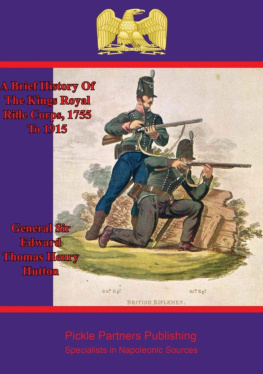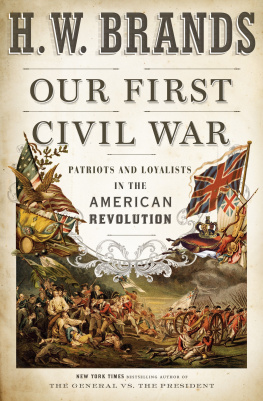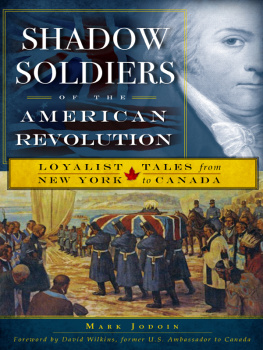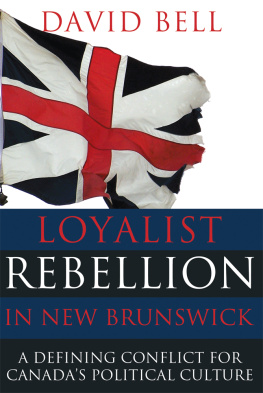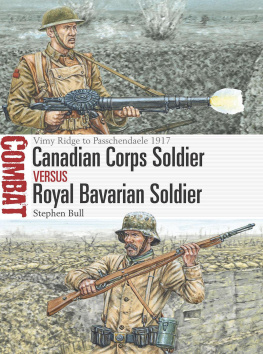Kings Men
the Soldier Founders
of Ontario
by Mary Beacock Fryer
Cover:
Kings Rangers or Loyal Rangers, foreground
Burgoynes provincials
design by ron & ron design photography
Kings Rangers in motley garb
Butlers Ranger in parade dress
Privates, Royal Highland Emigrants
Officer, Kings Royal Regiment of New York
Kings Men
the Soldier Founders
of Ontario
Kings Men
the Soldier Founders
of Ontario
by Mary Beacock Fryer
In memory of my loyalist ancestor, Private Caleb Seaman, New York Volunteers, (Third American Regiment).
Copyright Mary Beacock Fryer, 1980
All rights reserved. No part of this publication may be reproduced, stored in a retrieval system, or transmitted in any form or by any means, electronic, mechanical, photocopying, recording, or otherwise (except brief passages for purposes of review) without the prior permission of Dundurn Press Limited.
Design: Ron and Ron Design Consultants
Dundurn Press Limited
P.O. Box 245, Station F
Toronto, Canada
M4Y 2L5
The author and publisher wish to acknowledge the generous assistance of the Canada Council and the Ontario Arts Council.
We especially wish to acknowledge the Ontario Heritage Foundation, Ministry of Culture and Recreation whose grant-in-aid of publication made this book possible.
Printed and bound in Canada by T. H. Best Printing Company Limited
Canadian Cataloguing in Publication Data
Fryer, Mary Beacock, 1929-
Kings men
Includes index.
ISBN 0-919670-51-2 (bound)
1. United Empire Loyalists.* 2. Canada - History - 1763-1791. 3. Canada - History, Military - To 1900.* I. Title.
FC3070.L6F79 | 971.3'01 | C81-094163-5 |
F1058.F79 |
Table of Contents
List of Maps
List of Illustrations
Preface
During the American Revolution, thousands of men in Britains North American colonies enlisted in what were called Provincial Corps of the British Army. Originally this work was to be a history of those American loyalists who joined provincial regiments in the Province of Canada, but such an approach was too narrow. One group of provincials on duty in Canada from 1775 until 1784, the first battalion Royal Highland Emigrants, consisted for the most part of colonials who were resident in Canada or Newfoundland before the war began. Yet because some of the men in this corps were American loyalists it could not be excluded.
Another complication arose over the status and function of the Indian Department, and its relationship to two of the corps, the Kings Royal Regiment of New York and Butlers Rangers. The history of both these regiments is intrinsically bound to that of the officers and men who were recruited under the auspices of the Superintendent of Indian Affairs, whose establishment was separate and distinct from the provincial corps. It was neither feasible nor desirable to recount the actions of these regiments in isolation from those of the Indian Department. Then, too, some of the men who enlisted in provincial corps served in the naval establishment, as artificers and as crews on the ships of the Provincial Marine.
This study seeks to unearth the neglected period in the lives of the founding fathers of the Province of Ontario and their families. The myth, related in countless versions, tells that after the revolution ended, thousands of the Kings friends in the former Thirteen Colonies left their homes to settle in the wilds of Canada. Such a statement has some validity for loyalists who gathered at New York City and were transported to the Maritime provinces, but it will not suffice for Ontario. While the migration of loyalists into British territory continued until the end of the century, many of Ontarios founding families were in Canada all through the war. The men served in provincial corps, certain of the woman doing the housekeeping, while mothers with small children, the elderly and infirm, were encamped around Montreal and along the lower St. Lawrence years before the war ended. Some refugees fled directly to the British garrisons at Fort Niagara and Carleton Island, and a few made their way to Detroit. At Niagara they were settling years in advance of the main migration up the St. Lawrence that occurred in the spring of 1784.
Engrained mythology that envisages loyalists, both provincial troops and civilians, marching out of the United States at the close of the revolution denies Ontarios founders their place in Canadian history prior to 1784. While there is drama in the story of how they attacked the forest primeval and coped with the cruel land, surviving the Hungry Year, it pales in the light of what they endured and strived to achieve before they faced up to the reality that their future lay in Canada. The story of their efforts to regain the colonies, the intrigue, subversion and individual acts of derring-do is information that captures the imagination.
For Canadian history, the importance of the loyalists is that some of them became the refugee founders of English-speaking Canada, the interesting part the years they spent fighting a war. Our history has been accused of being dull, and in truth, because historians have often seen fit to concentrate on events of significance, omitting the trivial but stimulating, it often appears to be drab. Yet the unimportant ought to precede the event of moment if it is interesting. See what this approach can do for Butlers Rangers. It is best to begin with the news that they vanquished that coonskin-hatted American folk hero, Daniel Boone, before admitting that their contribution to Canadian history was the founding of Niagara-on-the-Lake.
Typical of any young country, Canadian history had to be too good to be true at first. Myth-makers have transformed the loyalists from losers into upholders of empire: from homeless refugees into a nobility. Because they did not want independence, they have been miscast as imperialiststoday a dirty word and one with irrelevant overtones for loyalists of the American Revolution. In fact, they merely wanted to retain the rights they enjoyed as British subjects. Their empire was not the powerful force of Queen Victorias day, the era when the myth-makers were at work. Then, too, it should not be forgotten that Canada, for loyalists, was second best. They really wanted to return to their homes, to take up their old lives among loved ones. No British colony, with the exception of Australia, ever had less willing founding fathers than Ontario or New Brunswick.


